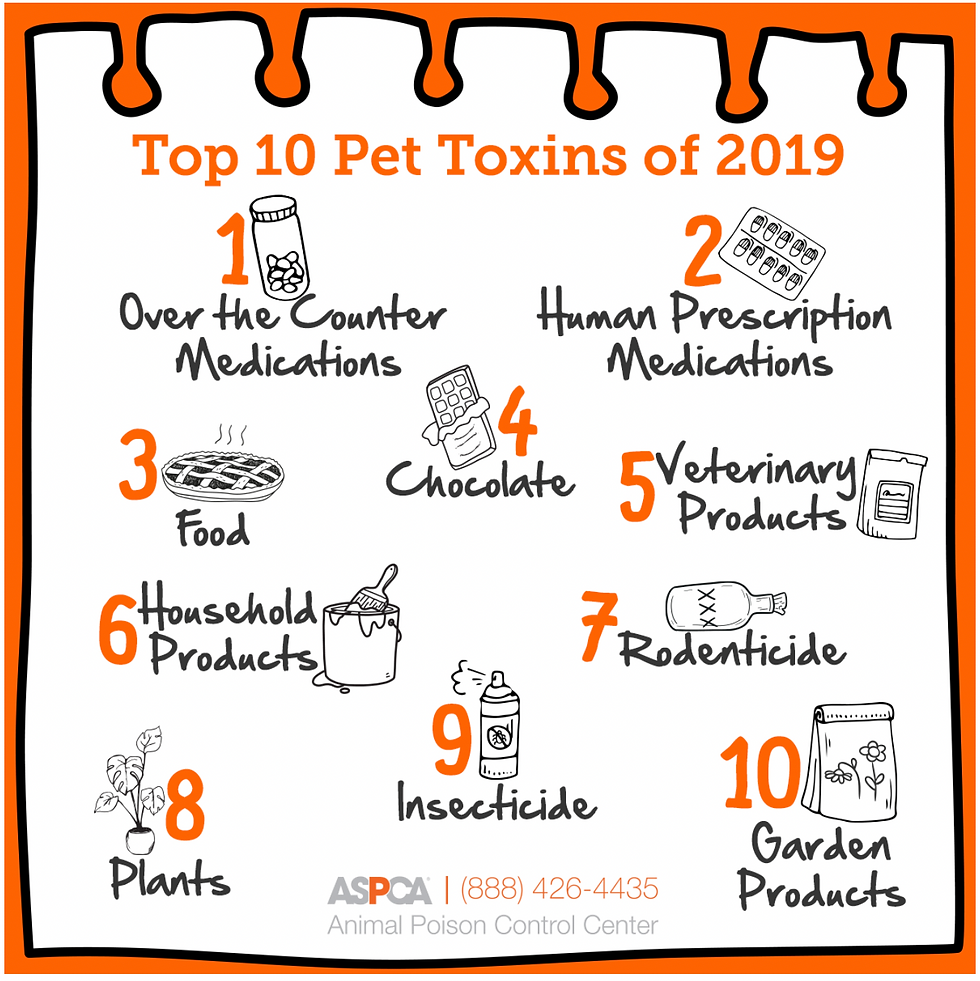National Animal Poison Prevention Week
- Christine Iversen
- Mar 22, 2022
- 3 min read
If you’ve been following our social media pages, you already know that this week is National Animal Poison Prevention Week.

(Not following us yet? Check us out on Facebook and Instagram for adorable and informative animal content!)
In this post, we’re going to dive a little deeper into how to keep your pets safe from everyday foods, plants, and objects that can hurt them and talk about what to do if they get into something dangerous.
Let’s go!
What Is National Animal Poison Awareness Week?
Observed annually in the third week of March, this week is meant to educate pet owners not only on what might be a danger to their pets, but how to recognize signs of poisoning and what to do if your pet has ingested something dangerous.
The awareness week came about in 2019 with the release of the American Society for the Prevention of Cruelty to Animals’ (ASPCA) list of Top 10 Toxins For Pets.

This effort ties into National Poison Prevention Week which raises awareness of the dangers of poisonings for people of all ages and promotes community involvement in poisoning prevention.
The Importance of Poisoning Prevention For Pets and Kids
Why is this so important? According to a proclamation from the White House earlier this week, more than 2 million human poisoning cases are reported in the United States annually, many of which are preventable.

Unfortunately, an average of 31 children die from unintended poisonings at home each year, and an estimated 75,000 children under the age of five end up in hospital emergency departments from poisoning.
As for our pets, the ASPCA screens almost 200,000 cases of potential pet poisons annually. And according to this publication by the AAHA, calls to the Pet Poison Hotline have spiked 43% during the pandemic, due in part to more people being home more.
According to the article, people being home more often not only means they are using toxic household products more often, but they are around their pets more to see when they get into something they shouldn’t.

The pandemic has also closed down many veterinary clinics for long periods, meaning pet owners turned to hotlines more regularly, because they couldn’t just take their pets in to be treated.
What is Dangerous For Your Pets
According to ASPCA, human medications account for more than 30 percent of pet poison cases. Other household items such as cleaners, pesticides, and air fresheners also can pose a threat to your animals. Be sure to keep these locked up and out of reach—from pets and kids alike.

Foods can also be a danger to animals. Some common foods to keep away from your pets are chocolate, avocados, garlic, onions, grapes, raisins, alcohol, raw yeast bread dough, and xylitol (an artificial sweetener found in gum and other items).

A less expected hazard is household plants. Some plants contain toxins that are harmful to your pet’s digestive and circulatory systems. Some plants to keep away from dogs and cats are tulips, azaleas, lilies, sago palm, and oleander, all of which can cause sickness or even death to your pets if left untreated.

Signs of Pet Poisoning
In a dog, signs of toxicity include:
Drooling or foaming at the mouth
Vomiting
Diarrhea
Depression/change in mood/lethargy
Seizures or muscle spasms
Trouble breathing
Fever/change in body temperature
Pale, blue, or yellow gums
In a cat, signs of toxicity include:
Drooling
Coughing
Diarrhea and Vomiting
Twitching or seizure
Breathing difficulties (rapid or labored)
Excessive drinking/urinating
Skin inflammation or swelling
Jaundice
Irregular heartbeat
Overall weakness
Loss of appetite
Change in mood/lethargy

What To Do If Your Pet Has Been Poisoned
It’s always a good idea to have the name of your regular vet as well as local emergency veterinary clinics posted in your home. This will save you the time and stress of looking these things up during an emergency situation
If you’re afraid your pet may have ingested something they shouldn’t have, and you can’t access a veterinary clinic, you can call ASPCA’s Animal Poison Control Center’s 24-hour emergency poison hotline at 1-888-426-4435.
The ASPCA Animal Poison Control Center provides toxicology education, consulting services, a review of case data, and a 24/7 veterinary diagnostic and treatment hotline.
The Pet Poison Hotline is another resource available 24/7. They can be reached at 1-200-213-6680.




Comments